- Home
- Alison McGhee
Never Coming Back Page 2
Never Coming Back Read online
Page 2
“What about my daughter?” she said, tilting her head in my direction.
“Your daughter? Well, there are resources available to her. Websites and forums that —”
“No. What about her chances?”
He nodded. Ah. Okay. I see what you’re wondering about. “The chances that your daughter,” he said, not looking at me, as if I weren’t sitting right there, “carries a PSEN1 gene mutation, which is the most common of the gene mutations that cause eFAD—early-onset familial Alzheimer’s disease—are fifty-fifty.”
Fifty-fifty. Five-oh five-oh. Half of one hundred. Every molecule of the twisted strands that made me me simmered and pulsed with fifty-fifty-ness. I pushed the thought away. I did not let fear bubble and rise inside me. Yet.
She was quiet on the way back to Sterns. Quiet and thin and straight in the passenger seat. She gazed out the window at the Utica floodplain, passing on the left, passing on the right. It wasn’t until we had crested and were coasting down the longest hill of Glass Factory Road—that huge and irresistibly steep downslope—that she spoke.
“When are you going back to Florida?”
“On Wednesday,” I said. “But here’s the plan, Ma. I’m going to move back up here. We can figure things out together.”
She nodded. Unlike her. My mother was not an acquiescent sort.
“I can supervise the wood stacking,” I said. “Make sure there’s enough of it for the winter. Make sure it’s not tossed in a big random pile, à la the way you would do it.”
My voice sounded false, in that fake, trying-to-sound-light way. Trying to act as if the only reason for me to move back to Sterns was to make sure there was enough wood for the winter and that said wood was correctly stacked. Ignoring the fact of her illness. Ignoring the fact of the distance between us, all that was hidden, all that had gone unspoken, all that was unresolved.
She nodded again.
“I figure I can be back in about a week,” I said. “Give notice on the Treehouse, load up the Subaru.” The Treehouse was my name for that little house, built into the limbs of an ancient live oak down on the Florida Panhandle, the forgotten coast of the Sunshine State. “It’s a month-to-month rental anyway, so that’s no big deal. Then zip up Ninety-five and be right back in Sterns. Poof!”
The poof did not come out the way I intended it. It was supposed to be light, a balloon tugging at its string, an interrobang of a word. But it fell flat. Tamar, straight and thin and quiet Tamar, nodded. Could she not do anything but nod? Who was she, the Nod of Wynken and Blynken? Anger flared inside me and my hands clenched the steering wheel. Nod, nod, nod. Was she just going to nod to whatever I said? Nod away her life?
* * *
Except it wasn’t that way.
In the single week that it took to move myself out of the Panhandle and drive back north, my mother swept the rug out from underneath her life. Underneath our life. There was a standing cash offer on the house and the storage barn and all the surrounding land from one of the Amish families who had moved into Sterns, and she walked through the fields and woods to the too-small house where they lived with their eight children and took them up on it. I heard about this after the fact, from the neighbor William T. Jones, who along with his girlfriend, Crystal, had helped her pack everything up. Kitchen and dining and living room and Tamar’s bedroom and my old bedroom. Bathroom and mudroom.
It sounded like such a long list. All those rooms. As if there would be box after box, bag after bag, truckload after truckload. But there wasn’t. My mother was a woman of few possessions. You could say she was born winnowed. Ahead of the curve. The Amish paid cash for what they wanted and Tamar called the Salvation Army to pick up the rest.
“What about the books?” I said to William T. “Did she donate them too?”
Because there were hundreds and hundreds of them. The books of my childhood, all the books that had gotten me through all the years of school, when I propped them up behind my textbooks and read and read and read, the books that had gotten me through all the summers in Sterns, all those holidays where it was me and Tamar and no one but the two of us and all the other people I loved, the invisible people who lived between the pages of my books.
“Those too?” I said. “All my books, gone? My books?”
I kept repeating myself, as if William T. didn’t quite understand English. But William T. understood both English and me. He shook his head and put his hands on my shoulders. Calm down, Clara, calm down.
“The books are safe,” he said. “We’ve got them at our house. We’ll bring them by for you.”
The next night there they were on Turnip Hill Road, William T. and Crystal, the bed of the truck filled with box after box after box of books. We formed an assembly line and passed the boxes one at a time onto the porch: six high and six deep.
“She gave everything else away?” I said, once the porch was buried with books. “There’s nothing else?”
“There’s this,” William T. said, and he held out the blue ceramic urn that held the ashes of Dog, gone now for nearly a decade. I cradled it against my heart.
“I’m sorry, Clara.”
“That’s okay. It doesn’t matter.”
Except that was a lie, because it did matter. What I wanted was not nothing else but everything else. Everything back in its place, including my mother, the way she used to be. Including me, the way I used to be, before the fear—fifty percent, five-oh, exactly half—entered my mind and my heart. William T. touched my shoulder, and Crystal gave me a hug, then they told me to call them, I had their number, and they got back in their truck and drove away down Turnip Hill Road.
Into the cabin I hauled the boxes of books, where I turned them into furniture. Like the boy in Where the Wild Things Are, whose walls became the world all around, who sailed away in a boat over days and weeks and months and a year, except there was no boat for me. Only books. And Dog? Dog sat in his urn on the kitchen shelf.
* * *
My mother didn’t know that on the long drive north, while she was boxing up her life without telling me, I had made plans. I would support us with Words by Winter.
Looking for the right words? Unable to find them? Not sure how to get your message across? Words by Winter is at your service. In tough times, in good times, in times of thankfulness and times of loss, our wordsmiths, with their uncanny ability to craft the perfect words for any occasion, are by your side. $100 for up to 100 words, payable via PayPal. Our motto: “If it can’t be said in a hundred words, then it can’t be said in a thousand.” www.wordsbywinter.com
I used to run that ad here and there, in the beginning. Online, mostly. Word got around once I had happy clients, though. You’d be surprised how many people and places now recommended Words by Winter: wedding planners, funeral homes, dating sites. So yes, Words by Winter would support us, one hundred dollars at a time, and while there was still time, my mother and I would get into a routine. While there was still time, we would watch the television show Jeopardy! together, which in my head I always spelled with the proper exclamation mark! because that was what copyright laws were all about!, and eat dinner together and go for walks together. While there was still time, we would somehow figure out how to talk about the past, the said and the unsaid, and all that was locked up between us would be unlocked. The common denominator of each of those scenarios was the assumption of enough time before the erasure of time, that with enough time, the key to the kingdom would be yours and mine.
But that was not what happened.
See the daughter in her jam-packed Subaru, hands on the wheel, neck aching from the strain of staring straight north, I-95 unspooling before her for a thousand and more miles. See her as she takes Exit 31 off the New York State Thruway, hands the tollbooth man a wad of ones, then angles the car northward again. Up and down Glass Factory. Right, then right, then left through the town of Sterns and north to the driveway of the house where her mother lived, the house where she herself grew up, the ho
use where her mother should be. Where her mother had always been. Would always be. See how the tenses mixed themselves up from that moment on, because who was the woman walking out the door onto the porch? Why was Tamar dressed up like an Amish woman? Why was there an outhouse in the backyard? Who was the Amish child in the bonnet pulling clothes off the clothesline? Whose horse and buggy were clopping into the driveway? Not Tamar’s. Not mine.
“Ma.”
That was me, standing in the place where my mother lived now, that same night. The Amish woman had given me the address. She had also given me a taped-shut shoebox, Keds, size nine—the only shoe my mother wore besides her winter boots. I had tried to give it back to her but she shook her head and turned away.
“Ma.”
“Clara.”
See the boxers as they enter the ring. The thin middle-aged woman stands straight in her corner, next to the drooping orchids on the plant stand. In her hand is one faded orchid blossom, deadheaded. The thin younger woman with the lavender-streaked dark hair stands not as straight in her corner. No cheering crowds. No attendants to towel them off, rub their shoulders, give them pre-fight pep talks. Theirs is a battle of posture, eyes and words. They have met before, these two, in many a previous ring, and neither has yet emerged victorious.
“Why, Ma?”
That was the younger woman. Inked black wire twining up one arm and down the other, the beginnings of it just visible below the rolled-up sleeve of her blue shirt.
“Because.”
That was the older woman, the one with the dead flower in her hand. No tattoos for her. Hair still dark, mouth set, eyes unblinking. Why? Because. Asked and unanswered.
“You didn’t have to do this, Ma. You didn’t have to move into this place. You could have stayed in the house.”
She shook her head, that quick back-and-forth Tamar shake. Definitive. Case closed. But the case wasn’t closed. Everything that was gone—the house, the furniture, her clothes, her indoor geraniums, her cocktail fork, her cans and jars of food, her bird feeder, the dishes that we had eaten off of all my life, all my life, all my life—came swarming up inside me and turned my vision dark. My hand came up to my throat. My heart hammered, ready to stampede its way out.
“You didn’t have to do this,” I said. “I’m here. I moved back.”
For you, was what I managed not to say, for you I moved back. Italicized subtitles scripted themselves along the bottom of the movie screen in my mind. Who was she, this woman? What kind of person closed down her entire life in a single week and moved herself into this place with no help, no advice, no warning? Who did this kind of thing? The couch was behind me and I sank down onto it.
“Why didn’t you tell me?” I said.
My voice in the air between us was like wire, like the tattooed wire that wound itself up my arm and, invisible unless I was naked, around my back and down my other arm, so that when my arms were tight at my sides, I was bound around with wire. So that something was holding me at all times. Something that would not let me fall apart, no matter how bad things got.
“I’m your daughter,” I said.
Something flickered in her eyes. “I know that.”
“Then why would you do this? It was my house too!” Exclamation mark. Boldface. The words boldface exclamation mark began scrolling along the bottom of my mind in tiny typeface. Boldface exclamation mark! Boldface exclamation mark! Boldface exclamation mark! I mentally batted them away. But angry words spilled out anyway.
“Ma, it didn’t have to be this way!”
“Clara.”
Something in her voice. Something that made the exclamation marks stop. Something that made me look up at her instead of at the floor, where I was tracing the outline of the fake Persian rug with my eyes. Up one side, down the next, up one side, down the next. Rectangle rectangle rectangle.
“WHAT.”
“Clara.”
“You never listen to me. You never did listen to me.” My voice kept coming out in italics and boldface and exclamation marks and I was helpless against it; it had taken on a life of its own and it would have its say.
“I always listened to you,” she said.
“You did NOT. You wrecked things for me, Ma. You were the reason Asa broke up with me. Admit it. Admit it!”
She came toward me then. The boxer advanced from her corner, faded flower dangling from her hand, Keds silent on the floor the way she was always silent on the floor. She stood before me, my mother, my only mother, and she looked at me the way a person looks at another person when she knows there is little time left and she has little left to lose.
“Why do you say that?”
Because it’s true. Because I looked through the window and saw the two of you talking that night. I saw how upset he was. And you wouldn’t talk, and he wouldn’t talk, and next day he broke up with me and then he was gone and it was your fault. It was your fault.
It had to have been her fault. And if it wasn’t, then why did she have no explanation for me? Why had she just turned her head away? Asa wouldn’t tell me what she said and she wouldn’t tell me what she said and then boom, Asa broke up with me, and boom, Asa enlisted in the army, and boom, she forced me out of state for college, and boom, a whole bunch of years went by until boom, here we were. This was where we found ourselves. With her having just sold off, given away or packed up our entire lives and moved herself into a nursing home with the money she got from selling the house. Ma, this can’t be happening. Ma, this can’t have happened. Ma, please can we go back in time, please can we do it over, please, please?
But time was what we had run out of, and it happened so fast.
We went so wrong.
That was the sentence in my head, a snake slithering after its own tail. I pushed aside the memory of a night back then, an awful night that still lived in my mind, a night when I had screamed and screamed at her, said awful things, a night neither of us had spoken of since. Not then, and not now. She stood there waiting, waiting for an answer, an answer that never came, and she did not back down. I had to give her that. The senior boxer held her ground, her only weapons a faded flower and an unblinking gaze filled with, what? Entreaty. That was the word. Entreaty.
She was exactly as tall as me. How was it possible I had not noticed that before?
* * *
In the wake of that asked and unanswered nonconversation, the boxers retreated to their separate corners of the ring. Unbloodied and unbeaten on the outside, but on the inside, a different matter. Their scars were invisible but crippling.
Difficult Mothers for $400, please. Difficult Daughters for $600. If this were a real-life Jeopardy! game we would be the Daily Double.
Jeopardy! was the only ritual left now out of everything I had planned. The others I had thought up as I clutched the steering wheel and sped north—walking our woods, cleaning and organizing our house, stacking wood for the winter—were no longer possible. Even making dinner for my mother, that most modest of goals, was not possible, because there was no kitchen in my mother’s room. No cupboard in which to arrange the cans and bottles she liked to eat from with a cocktail fork. No cocktail fork.
I ate dinner with my mother in the communal dining room at the place where she lived now—which was how I thought of it, instead of the memory care wing of a care facility/nursing home—exactly once. Mashed potatoes and pork roast and applesauce. She ate that dinner with a spoon and a knife and a fork, a regular-size fork. The sight of my mother sitting in a regular chair and eating from a regular plate with regular utensils and a paper napkin in her lap smote my heart. No. Not this, not for my mother, the Fearsome Tamar, who all my life had leaned against the counter with an opened can or jar, plucking out olives or marinated artichoke hearts or other bits of food one by one.
So: Jeopardy! A television game show was what we had left.
When I visited, we usually sat in the community room down the hall from her bedroom, watching. I arrived in plenty of time, many minutes
before the show began at 7:30 p.m., because Tamar hated to be late. All her life she had hated to be late, but of late, her lateness hatred had intensified. On one such visit the television was already on, muttering low, a cooking show in which the contestants were given baskets of unknown ingredients from which to prepare a feast.
“That’s not the right ______” my mother said, and turned to me.
______ was what the look on her face meant, which was Help me, I can’t find the right word. It’s here, it’s near, it’s just out of reach.
“Channel,” I said. I took the remote from the coffee table and clicked. “Here we go.”
Jeopardy! was the most-watched television game show in history and Alex Trebek was its longest-running and most intimidating host. Contestants often seemed to cower before him. That night, a tax accountant was in the lead. He kept pressing the buzzer first, in an annoyingly fast and tense way, beating the other two contestants.
“Baseball for two hundred, please,” he said.
Sometimes known as the white Josh Gibson was the clue.
“Who the hell’s Josh Gibson?”
I was talking to myself, but from the look on the tax accountant’s face, he was thinking the same thing. This was his second night on the show. Baseball for $200, the lowest bet possible. Most contestants started with the lowest. They thought small, confined themselves. They put themselves in the prison of tiny bets. The tax man was no different.
“I mean, I’ve never heard of the guy,” I said.
My mother sat next to me eating fudge. Peanut butter fudge, which I had brought her as a gift from Vermont, where I had spent the day hiking. Driving back, I took Route 9 west across the very bottom of the state so that I could stop at the Hogback Mountain gift shop and buy my mother half a pound of her favorite fudge. Fudge was delicious. Fudge was safe.

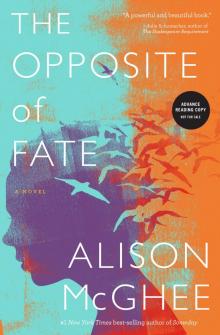 The Opposite of Fate (ARC)
The Opposite of Fate (ARC)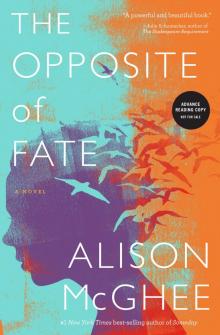 The Opposite of Fate
The Opposite of Fate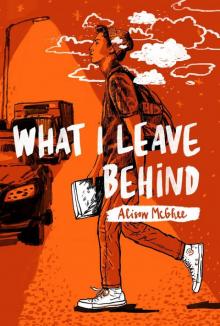 What I Leave Behind
What I Leave Behind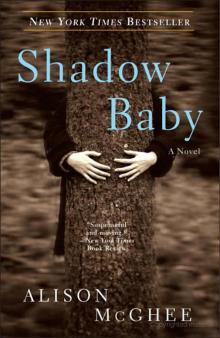 Shadow Baby
Shadow Baby All Rivers Flow to the Sea
All Rivers Flow to the Sea Was It Beautiful?
Was It Beautiful? Firefly Hollow
Firefly Hollow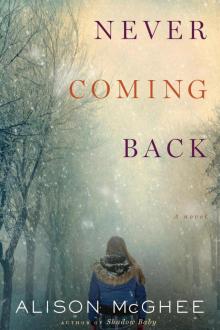 Never Coming Back
Never Coming Back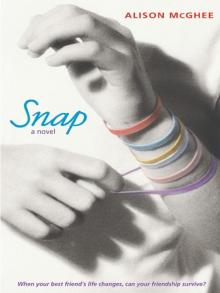 Snap
Snap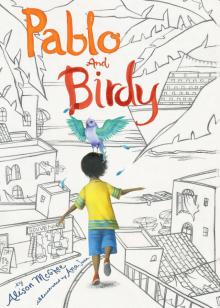 Pablo and Birdy
Pablo and Birdy